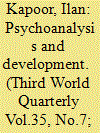|
|
|
Sort Order |
|
|
|
Items / Page
|
|
|
|
|
|
|
| Srl | Item |
| 1 |
ID:
135554


|
|
|
|
|
| Summary/Abstract |
What the British historian Eric Hobsbawm called “the long 19th century” ended 100 years ago, in 1914, in Sarajevo, with the two pistol shots that sparked World War I. Another historian, Fritz Stern, described that war as “the first calamity of the 20th century … the calamity from which all other calamities sprang.” These disasters included the Great War itself, which claimed some 20 million lives, including victims of the new century’s first genocide, in Turkey; the October Revolution in St. Petersburg, which gave birth to an ideological empire that would kill tens of millions of people and imprison hundreds of millions more; the rise of Nazism out of Germany’s defeat; World War II, with another 60 million deaths, including genocide on an unprecedented scale; the upheavals and wars beyond the borders of Europe that followed the end of colonialism; and the division of the postwar world into two nuclear-armed camps, which fought each other through proxies in post-colonial lands.
|
|
|
|
|
|
|
|
|
|
|
|
|
|
|
|
| 2 |
ID:
137000


|
|
|
|
|
| Summary/Abstract |
This article is largely based on historical analysis of an overlooked and unexplored colonial document. The Sir James Clark Enquiry of 1868, conducted by the Government of India, contains rich evidence of the mindset of policymakers and those who implemented colonial psychiatry in 14 institutions. While the state regarded the asylum system as burdensome, it made ample efforts to sequester the insane. In view of such ambivalence, the article scrutinises the relationship between colonialism and psychiatry, and also probes some reasons behind the state’s inability to establish superior-quality asylums in India. The findings throw new light on the limited colonial agenda of psychiatry in India, highlighting the basically punitive nature of psychiatric infrastructures, linked with attempts to create an ordered society, but above all to minimise costs.
|
|
|
|
|
|
|
|
|
|
|
|
|
|
|
|
| 3 |
ID:
134637


|
|
|
|
|
| Summary/Abstract |
This article examines the contributions of psychoanalysis to international development, illustrating ways in which thinking and practice in this field are psychoanalytically structured. Drawing on the work of Lacan and Žižek, the article will emphasise three key points: (1) psychoanalysis can help uncover the unconscious of development – its gaps, dislocations, blind spots – thereby elucidating the latter’s contradictory and seemingly ‘irrational’ practices; (2) the important psychoanalytic notion of jouissance (enjoyment) can help explain why development discourse endures, that is, why it has such sustained appeal, and why we continue to invest in it despite its many problems; and (3) psychoanalysis can serve as an important tool for ideology critique, helping to expose the socioeconomic contradictions and antagonisms that development persistently disavows (eg inequality, domination, sweatshop labour). But while partial to Lacan and Žižek, the article will also reflect on the limits of psychoanalysis – the extent to which it is gendered and, given its Western origins, universalisable.
|
|
|
|
|
|
|
|
|
|
|
|
|
|
|
|
| 4 |
ID:
136944


|
|
|
|
|
| Summary/Abstract |
The essay examines four major texts that are associated with C.L.R. James’s residence in Nelson, Lancashire, during 1932–1933 – Minty Alley (1936), The Life of Captain Cipriani (1932), ‘The Greatest of All Bowlers: An Impressionist Sketch of S.F. Barnes’ (1932) and Cricket and I (1933), written with Learie Constantine. Arguing that they form a distinctive group rather than a preparatory phase of James’s writing, it focuses upon the dialogic relationship between their various genres and upon their shared concern with the colonised and performative body. Minty Alley, completed before James’s emigration, establishes his interest in the inscription of colonial legacies that delimit the possibilities of indigenous Trinidadian social and economic development, a predicament that informs the explicitly political analysis of the island’s governance in Captain Cipriani. The two later ‘Nelson’ texts chart James’s use of Lancashire League CRICKET to develop parallel analyses of Caribbean and English class and racial categorisation and their resultant social exclusions. Using James’s portrayal of Sydney Barnes to explore the structures of professional CRICKET and traditions of English sports journalism, the essay suggests that the distinctive body culture of the League allowed James to establish an anti-colonial politics rooted in both Caribbean and English popular performance cultures.
|
|
|
|
|
|
|
|
|
|
|
|
|
|
|
|
| 5 |
ID:
135326


|
|
|
|
|
| Summary/Abstract |
This article sheds light on the development in the relationship between the Lebanese Maronite church and the French colonial authorities during the mid-1930s. It focuses on the confrontational stance of the church toward the French under the leadership of Patriarch Antoine ’Arida (1863-1955). I delineate ’Arida’s resistance to the imposition of the tobacco monopoly, the Régie, and his diplomatic and political maneuvers, culminating with the 1935 popular uprising against the French, which cut across Muslim and Christian lines. Through the analysis of French archival documents and reports, I argue that the deterioration in Maronite-French relations was primarily caused by the colonial mapping of Grand Liban and its disruptive consequences for Mount Lebanon’s leadership and economy. With the French imposition of the tobacco monopoly, the conflict took the form of a nationalist resistance against the French. Ultimately, the Maronite Church pursued a delicate balance between the interests of its parish and commitments to the French. The crisis sparked a critique of the French colonial logic, pushing the Maronite Church and the nationalist Lebanese elite to struggle for independence from the French.
|
|
|
|
|
|
|
|
|
|
|
|
|
|
|
|
|
|
|
|
|